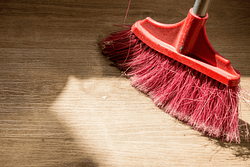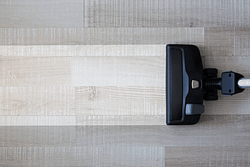Hardwood floors are a timeless and elegant addition to any home.
However, they require regular maintenance and cleaning to preserve their beauty and longevity.
In this blog post, we will provide you with the ultimate cleaning tips to help you keep your hardwood floors looking their best.
From daily maintenance to deep cleaning techniques, we've got you covered.
Understanding Hardwood Floors
Before diving into the cleaning tips, it's essential to understand the nature of hardwood floors.
Hardwood floors are made of natural wood, which can be susceptible to damage if not properly cared for.
They are sensitive to moisture, heat, and abrasive materials.
By understanding the characteristics of hardwood floors, you can choose the right cleaning methods and products to protect them.
Cleaning tips for hardwood floors
1. Daily Maintenance
Daily maintenance is crucial for preserving the beauty of your hardwood floors.
Here are some tips to incorporate into your routine:

1. Sweeping:
Sweeping your hardwood floors daily helps remove dirt, dust, and debris that can scratch the surface.
Use a soft-bristled broom or a microfiber dust mop for this task. Avoid using a regular broom with stiff bristles as it may cause scratches.

2. Vacuuming:
If sweeping alone doesn't remove all the dirt, using a vacuum cleaner is a great alternative.
Ensure that your vacuum has a bare floor attachment or setting to prevent scratching the wood.
Avoid using rotating brush attachments as they can damage the floor's finish.

3. Spot Cleaning:
Accidental spills and stains should be addressed immediately to prevent permanent damage.
Use a soft cloth or paper towel to blot the spill gently.
Avoid rubbing vigorously as it can push the liquid deeper into the wood.

4. Using Doormats:
Placing doormats at entryways is an effective way to prevent dirt and debris from being tracked onto your hardwood floors.
Encourage family members and guests to wipe their shoes before entering your home.
2. Choosing the Right Cleaning Products
Using the correct cleaning products is essential for maintaining the beauty of your hardwood floors without causing any damage.
Here are some guidelines on choosing the right products:

1. pH-neutral Cleaners:
When it comes to cleaning hardwood floors, avoid using harsh chemicals or abrasive cleaners as they can strip away the finish and damage the wood.
Instead, opt for pH-neutral cleaners specifically designed for hardwood floors.

2. Homemade Solutions:
If you prefer natural and eco-friendly cleaning options, there are several homemade solutions you can try.
A mixture of vinegar and water (in a 1:10 ratio) is an excellent choice for regular cleaning.
However, make sure not to use excessive amounts of liquid on the floor, as too much moisture can harm the wood.

3. Avoid Oil- or Wax-based Products:
While it may be tempting to use oil or wax-based products to add shine to your hardwood floors, it's best to avoid them.
These products can leave a residue that is difficult to remove and may make the floor slippery.
3. Deep Cleaning Techniques
In addition to daily maintenance, periodic deep cleaning is necessary to remove built-up grime and restore the luster of your hardwood floors.
Here are some techniques you can employ:

1. Damp Mopping:
Damp mopping is an effective method for deep cleaning hardwood floors.
Use a well-squeezed mop or microfiber cloth dampened with a pH-neutral cleaner diluted in water.
Avoid soaking the mop as excess moisture can damage the wood. Always follow the manufacturer's instructions for the cleaner.

2. Steam Cleaning:
Steam cleaning can be an option for deep cleaning hardwood floors; however, it should be used with caution.
Ensure that your floor's finish is in good condition and consult with the manufacturer before using a steam cleaner.
Improper use of steam cleaners can cause warping or cupping of the wood.

3. Professional Cleaning:
For heavily soiled or damaged hardwood floors, it's advisable to seek professional cleaning services.
Professional cleaners have specialized equipment and expertise to restore your floors' beauty without causing any harm.

4. Avoid Excessive Moisture
Excessive moisture can damage hardwood floors, causing warping, swelling, and mold growth.
Here's how you can prevent it:
- Use a damp mop or cloth when cleaning your hardwood floors. Avoid saturating the floor with water or leaving standing water.
- Wipe up spills immediately to prevent them from seeping into the wood.
- During rainy seasons, use doormats at entryways and consider placing a boot tray for wet shoes to prevent excessive moisture from being tracked onto the floors.

5. Use Microfiber Cleaning Tools
Microfiber cleaning tools are gentle on hardwood floors and effectively trap dust and dirt.
Consider using microfiber mop pads, cloths, or dusters for your regular cleaning routine.
They are soft, lint-free, and won't scratch the surface of the wood.

6. Avoid High Heels and Shoes with Hard Soles
High heels and shoes with hard soles can cause significant damage to hardwood floors.
The pointed heels can dent the wood, while hard soles can leave scratches.
Encourage family members and guests to remove their shoes or wear soft-soled slippers when walking on the hardwood floors.

7. Manage Pet Hair
If you have pets that shed fur, it's important to address pet hair on your hardwood floors.
Here's how you can manage it:
- Regularly brush and groom your pets to minimize shedding.
- Vacuum or sweep your floors regularly to remove pet hair.
- Consider using a rubber broom or a pet hair removal tool to gather and remove pet hair effectively.

8. Refinishing and Recoating
Over time, hardwood floors may start to show signs of wear, such as scratches or dullness.
Refinishing or recoating the floors can help restore their original beauty.
Here's what you need to know:
- Refinishing: If your hardwood floors have deep scratches, stains, or extensive damage, refinishing might be necessary. This involves sanding down the surface, applying a new finish, and sealing it. It's a more involved process that may require professional assistance.
- Recoating: If your floors have minor wear and tear, a recoating can help revive their appearance. Recoating involves applying a new layer of finish without sanding the entire floor. It's a less time-consuming and cost-effective option.
Remember to follow manufacturer guidelines or consult with a professional if you plan to refinish or recoat your hardwood floors.

9. Preventive Measures
Prevention is key when it comes to maintaining hardwood floors.
By taking some preventive measures, you can minimize damage and prolong the lifespan of your floors:
1. Protective Pads:
Attach felt or rubber pads to furniture legs to prevent scratches when moving them.
Be sure to check and replace these pads regularly as they can wear out over time.
2. Area Rugs and Runners:
Place area rugs or runners in high-traffic areas such as entryways and hallways.
These will help protect your hardwood floors from excessive wear and tear.
3. Sunlight Protection:
Direct sunlight can cause your hardwood floors to fade over time.
Use curtains or blinds to block out harmful UV rays during peak sunlight hours.
4. Regular Floor Inspections:
Periodically inspect your hardwood floors for any signs of damage, such as cracks, gaps, or water stains.
Promptly address any issues to prevent further deterioration.
Additional cleaning tips you may find helpful:
Looking for recommendations for the cleaning supplies to get?
Continue reading on:
- 20 Best Cleaning Solution for Hardwood Floors
- 20 Best Cleaning Robots
- 20 Best Cleaning Gloves
- 30 Best Cleaning Laundry Detergents
- 30 Best Cleaning Solution for Laminate Floors
- 50 Best Cleaning Tools
- 50 Best Cleaning Supplies
- 59 Best Cleaning Products
- 20 Top Cleaning Gadgets for a Sparkling Home
- 21 Top Cleaning Tools for a Sparkling Home
- 10 Top Cleaning Products
Conclusion
Maintaining the beauty and longevity of your hardwood floors requires regular cleaning and proper care.
By following the tips outlined in this blog post, you can ensure that your hardwood floors remain a stunning feature in your home for years to come.
Remember, prevention is key, so establish a regular cleaning routine and take necessary precautions to protect your investment.
